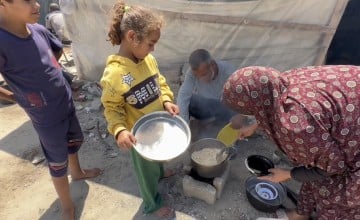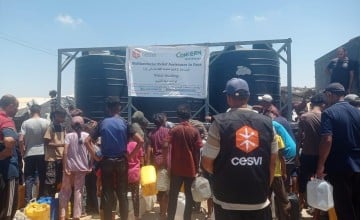
Read our 2024 annual report

Knowledge Hub
Famine has been officially confirmed in Gaza for the first time, with avoidable deaths set to rise exponentially without an immediate response.
The humanitarian situation in Gaza has been deteriorating in recent weeks, with starvation, malnutrition, and death rapidly accelerating. Now, a report from the Integrated Food Security Phase Classification (IPC) has confirmed that famine has been found in the Gaza Governorate, which includes Gaza City and the surrounding area. The IPC raised its classification here to Phase 5, the highest and worst level of its acute food insecurity scale.
The Famine Review Committee (FRC) also stated that the threshold for famine is expected to be crossed in Deir al-Balah and Khan Younis Governorates by the end of September.
While starvation and malnutrition have been playing out for months in Gaza, this is the first time famine has been officially confirmed by the IPC, which classifies the levels of food insecurity in countries and is what the international community uses to decide whether famine is taking place.
Famine, or Phase 5 on the IPC, represents the highest levels of hunger and malnutrition in a region. A famine is confirmed in an area when:
- 20% of a population are suffering extreme food shortages
- 30% of children under the age of 5 are suffering acute malnutrition
- The death rate of an area has doubled, or two people (or four children) out of every 10,000 people die each day

Tragically, the report states that the famine in Gaza Governorate is entirely man-made, and could be halted, but a lack of access for humanitarian aid could lead to a rise in entirely avoidable deaths.
The Famine Review Committee said: “As this famine is entirely man-made, it can be halted and reversed. The time for debate and hesitation has passed, starvation is present and is rapidly spreading. There should be no doubt in anyone’s mind that an immediate, at-scale response is needed. Any further delay - even by days - will result in a totally unacceptable escalation of Famine-related mortality. If an immediate and sustained ceasefire is not implemented to allow humanitarian aid to reach everyone in the Gaza Strip, and if essential food supplies, and basic health, nutrition, and WASH services are not restored immediately, avoidable deaths will increase exponentially.”
The report went on to say that malnutrition will threaten the lives of 132,000 children under five in Gaza until June next year, with 41,000 children expected to suffer from severe malnutrition - putting their lives at risk.
Following the release of the report, the United Nations Secretary-General Antonio Guterres called the famine declaration “a man-made disaster, a moral indictment and a failure of humanity itself”.
This is not a mystery — it is a man-made disaster, a moral indictment and a failure of humanity itself.
The Secretary-General wrote in a statement: “Just when it seems there are no words left to describe the living hell in Gaza, a new one has been added: “famine”.
“Famine is not only about food; it is the deliberate collapse of the systems needed for human survival. People are starving. Children are dying. And those with the duty to act are failing.”
Mr Guterres added: “Enough excuses. The time for action is not tomorrow — it is now. We need an immediate ceasefire, the immediate release of all hostages and full, unfettered humanitarian access.”
Concern's work in Gaza

Since the beginning of the conflict, 90% of the population of Gaza has been displaced, while the death toll is approaching 60,000. Health and sanitation systems have been destroyed, and families are forced to drink and cook with unsafe water to survive, leading to the spread of waterborne disease.
Concern is supporting our partners on the ground to deliver clean water to affected communities in Gaza through water trucks that are supplied by the few desalination plants still in operation. Providing clean water means allowing families to drink without falling ill, but also to cook the little food available in a safer way, preventing the spread of waterborne illnesses. This intervention has already reached 105,000 displaced people across Gaza.
Your donations have also allowed our partners to install a reverse osmosis machine in Northern Gaza’s last remaining children’s hospital, which ensures that 13 dialysis machines can continue running, saving lives every day.
Donate to our Gaza Crisis Appeal today





